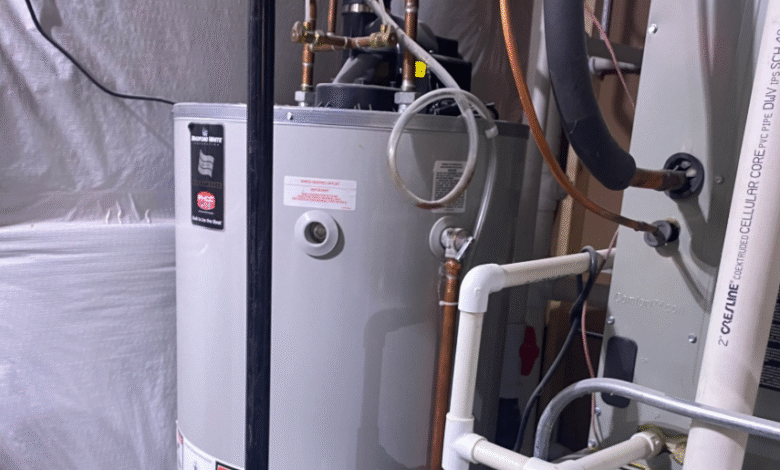When Is the Best Time to Replace Your Water Heaters

A reliable water heater is one of the most essential appliances in any home. It provides hot water for showers, dishwashing, laundry, and more. However, like all home systems, water heaters have a limited lifespan and eventually need to be replaced. Knowing when to replace your unit can save you from unexpected cold showers and costly emergency repairs. In this article, we’ll explore the ideal time to replace your water heater, the signs of wear, and why homeowners should pay attention—especially those in areas like Lexington where the demand for efficient heating systems is high.
Understanding the Lifespan of Water Heaters
How Long Do Water Heaters Last?
Most traditional tank water heaters have an average lifespan of 8 to 12 years, while tankless models can last up to 20 years with proper maintenance. However, environmental factors, water quality, and usage patterns can influence how long your water heater will function efficiently.
What Impacts the Lifespan?
- Water Quality: Hard water can accelerate corrosion inside the tank.
- Maintenance: Annual flushing and inspection can significantly extend the life of your heater.
- Installation Quality: Poor installation may lead to premature failure.
- Usage Volume: Larger families may wear out heaters faster due to higher demand.
See also: Best Souvenirs to Buy in Japan: Unique Gifts to Bring Home
Signs It’s Time to Replace Your Water Heater
Even if your unit is still running, certain signs can indicate that it’s time for a replacement.
Age of the Unit
One of the clearest indicators is the age of your system. If your unit is over 10 years old and you’re starting to notice issues, it may be time to upgrade. Residents dealing with aging Lexington water heaters should check their unit’s manufacture date, typically found on the serial number label.
Frequent Repairs
Are you calling the plumber more often than you used to? Frequent breakdowns, leaks, or heating issues may signal that the heater is reaching the end of its life. Instead of repeatedly fixing an old unit, investing in a new one can be more cost-effective in the long run.
Inconsistent or Insufficient Hot Water
A noticeable drop in hot water supply, or water taking longer to heat, can point to sediment buildup or heating element failure. This is particularly common in older Lexington water heaters, especially in areas with hard water.
Rusty Water or Tank
Rust-colored water coming from your hot water taps might indicate corrosion inside the tank. While this could sometimes be a plumbing issue, it’s often a sign that the water heater is deteriorating.
Unusual Noises
Popping or rumbling sounds can result from sediment buildup in the tank, which causes overheating and reduces efficiency. If these noises become more frequent, it’s likely time to consider a replacement.
Best Time of Year to Replace a Water Heater
Timing your water heater replacement can offer financial and convenience advantages.
Off-Season Installation (Spring and Fall)
Spring and fall are typically the best seasons to replace a water heater. During these months, HVAC and plumbing professionals are generally less busy compared to the winter and summer seasons. This means:
- Faster Service: Shorter wait times for scheduling.
- Potential Discounts: Some companies may offer lower rates during the off-season.
- Preparation for Winter: Replacing your heater before winter ensures you’re not caught without hot water during the coldest months.
Emergency vs. Planned Replacement
If your water heater fails unexpectedly, you may be forced into a rushed (and often more expensive) decision. That’s why planned replacement, especially when your unit is nearing the end of its lifespan, is a better strategy. Being proactive means you can research, budget, and choose the most efficient model for your needs.
Choosing the Right Replacement Water Heater
When it comes time to replace, consider both the type and efficiency of your new system.
Tank vs. Tankless
- Tank Water Heaters: Less expensive upfront, but generally less energy-efficient.
- Tankless Water Heaters: Higher initial cost but offer energy savings and longer lifespan.
Energy Efficiency Ratings
Look for high Energy Factor (EF) or Uniform Energy Factor (UEF) ratings to maximize energy savings. Homeowners replacing old Lexington water heaters with ENERGY STAR® certified units may also qualify for local rebates or tax incentives.
Why Lexington Homeowners Should Be Proactive
In Lexington, where seasonal temperature changes can be drastic, having a dependable hot water supply is crucial. Cold winters especially highlight the importance of having a reliable unit. Replacing outdated Lexington water heaters before they fail ensures comfort and safety year-round.
Additionally, Lexington homeowners who plan to sell their homes may find that an upgraded water heater adds value to their property. Real estate agents often highlight new or energy-efficient appliances as attractive features for buyers.
Maintenance Tips to Prolong the Life of Your New Unit
To get the most out of your replacement water heater:
- Flush the Tank Annually: Removes sediment and maintains efficiency.
- Inspect the Anode Rod: This metal rod prevents corrosion and should be replaced every 3–5 years.
- Check the Temperature Setting: Keep it at 120°F for optimal performance and safety.
- Schedule Regular Inspections: A professional check-up every 1–2 years helps catch issues early.
Conclusion
Replacing your water heater doesn’t have to be a stressful or costly emergency. By watching for signs of wear and planning your replacement around your schedule—preferably in the off-season—you can enjoy uninterrupted hot water and potentially save on installation costs. If you live in Lexington and your unit is nearing or past the 10-year mark, it may be the perfect time to evaluate your options. Reliable, energy-efficient Lexington water heaters are essential for comfort, efficiency, and long-term peace of mind.
